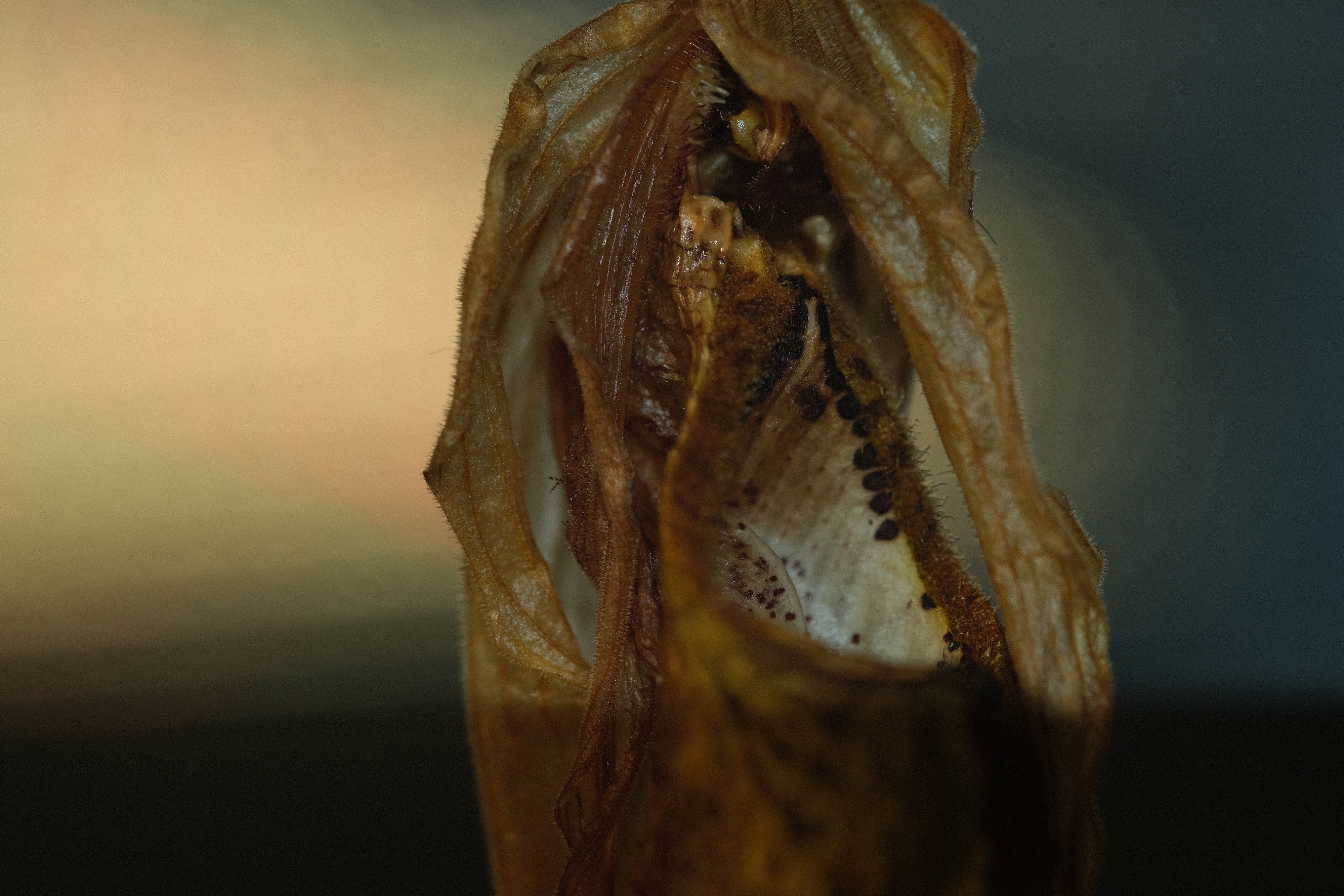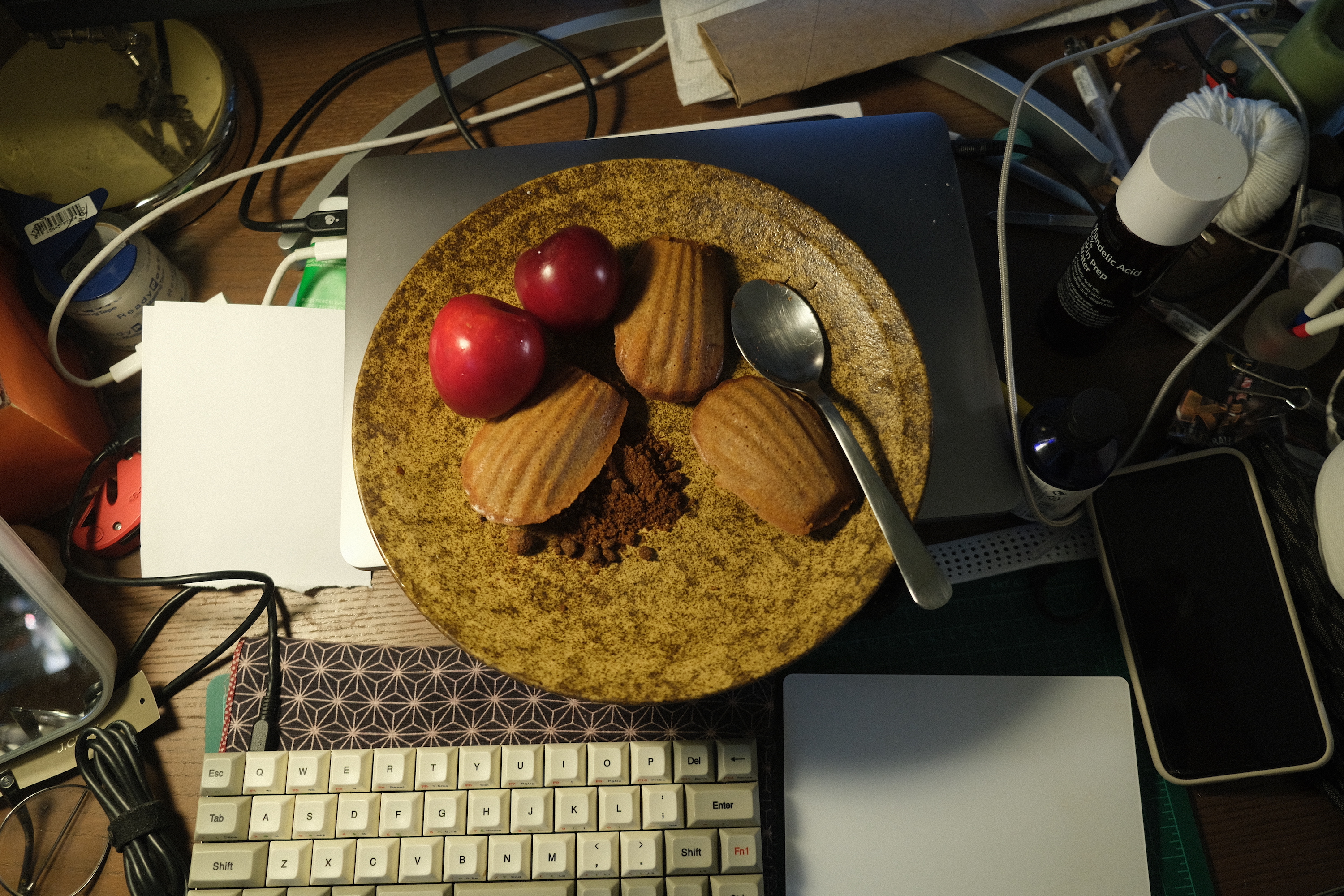Well, it’s October and I’ve got to admit that I don’t know what I’m doing. I wedge a fingernail between a crack in a tooth and check for erosion. I wish to slice ginger into tiny prisms, steel adjacent to the nail. With slow movements the garlic becomes uniformly small. Petite onions make my eyes sting too rapidly to produce catharsis. The irritation is impressive anyway, irritation without sadness. I am cooking in the most usual way but without a sense of rhythmic tranquility. Would be lying down or trying hard to do nothing, but I cannot control this electrical precision of dread. Better to be on the feet, not stricken by my weight against the floor. Every sound of notification knits my shoulders into anticipatory humps. The banners bring me nowhere; I suppose this is the time to turn off signals from the outside world and to swipe through ebooks, although I cannot really be held even by that womb. Thinking about how my own worked text is available on all phones. The text is now elastic; it flows across a horizontal which may be stretched. I read myself in various forms at various times. Time is almost unbelievable, but the measure of keys produces a feeling of oneness with time itself. I recognize that this is all a ruse designed to keep me afloat while I’m waiting. When I am alright I am thinking out of time. I am thinking about someone else’s sense of time. This is also supposed to be a home in which I exist without reference to other times, at least in theory. Which is it atm? Everything now is cut across time, existing here in the present before it is pushed off to the world of servers. This is a modest blog for orchids, but I gave up my modesty. Now I read books and do not capture, do not stare at pictures, become less sessile. I pretend the weekend is a time to work, so I do my reading; I’ve got my prescriptions for passing time and for inhabiting public space. My breathing is knotted up as I go on a run in the mist; I nearly touch a red squirrel running with a head-sized ball in its mouth; black walnut. A sadly fat pug receives from me a backwards glance over the shoulder. Otherwise, I wonder how to explain to a student what I mean. I eat too many concord grapes and bake madeleines with lemon and orange and cardamom. The batter must be refrigerated for at least one hour, and then it bakes hot for nine to twelve minutes. I’m glad to have survived the morning, but will I ever be able to enjoy myself again, truly enjoy myself? And if so, what’s going to happen between now and then?
There is something wonderful about this pain. It is better than me. Hence I neglect certain aspects of my work. I am nevertheless obligated to show up, and to experience the lack of superiority in my superiors. I am aware of the imprecision in one professor’s throat, in its phlegm, and in the oblivious smile which structures resultant phonemes. I search for a facial analogue for his inability to keep time, for the crude and light arrogance behind his theoretical investments, which so often coincide with the speech-genre of the tangent. There is a general looseness of thought which may have to do with any number of elements in his domestic life. A sickening impulse comes to kick him in that very throat. It is often coughing, there is something caught in it. My larynx is small in its stead, and perhaps one experiences the impulse to strangle me too. There is something particularly aggravating about the combination of neonate features in my face and the rough force of my words. I am incapable of vocal creaking, yet the soft sounds of my vowels produce annealed effects. And still the slight tubes which constitute my wristbones are easily encircled by even the smallest thumb and index finger. So much of me is easily broken, but so much of this is compact enough to save myself from a bad fall. Another professor has shattered his wrist; his body is large and rambling. When he speaks it will not end and it is boring. Once I was drawn to this man, now I find him unserious and erroneous. Only the smallest and cutest of women are trustworthy and smart. The professor of coughs compliments me once again, unaware of my second-hand embarrassment. Doesn’t he know that he may be provoking envy? He admires my intransigence today. I decide to interrupt him on a regular basis. They do ‘ove me for being “honest” and “provocative,” these men. Squeezing could be an act of ‘atred, or of ‘ove. But much anger distances, separates, hence the lack of feeling with respect to the lack of superiority in my superiors. Wd rather thnk bt love, love, that hyperbolic wrd. Wdrther’ba slcaker, typn’way ’t(d)‘is(t)‘ng, ‘ntl my eyes are bloodshot again. The nerve is still twitching. A week of twitching! The only way to regain my health? To keep time!

An anxious mind is at its heart a capable mind, capable of weaving dense fictions based in a wide range of experiential sources smashed together compulsively and without awareness of time. There is an undeniable homology between the faults of the male professors I mention above and the repetitive motor which undergirds my own thoughts under wired conditions, even if the affects produced and producing each state are diametrically opposed. Can the thirdness of orchids adjudicate my neuroticism when books and other languaged materials fail to intervene? I have experienced that same anxiety of waiting for the beloved to make itself present while watching a plant near death. The appearance of a new pseudobulb or root peeking out of dried brown sheath is like an email arriving from the right sender. And death, for a plant, is never simple—from dormancy something may arise or not, rot may come or not, and sometimes in fatal or non-fatal ways—I don’t know if I believe in mixed signals, but I do I believe that some things just aren’t determinate until one asks for a determination, and that it isn’t possible in some cases to ask for a deterimination at all. Does the plant lie open to the world, passively absorbing pathogenic materials without sensation? Without defense, there is no malevolence. The only way to know if a dying plant is dead is to kill it explicitly, to burn or poison it. Even cutting a plant up into little pieces may not work. I can accept misalignments in our experience of time and energy because I believe that some people are special, that some are more vegetative than the human norm. I can demand and hope for signs that I am desired back, but this is not the way to induce shoots. Or, I can work to make myself a desirable place in which to live—this presupposes that you already exist inside of me. And I’m comforted by the fact that the dessication of a flower once it has failed to reproduce is an undeniably beautiful process which provokes no such anxiety. I believe there is nothing more comforting to look at. Cadavers are often beautiful, but because they represent the death of the entire being, they provoke some measure of unease in the animal onlooker. When a flower wilts, I know more flowers will come, and that they will be roughly identical to the ones which preceded them. I don’t have a guarantee that the plant will continue to live until its next bloom, but the somewhat repetitious nature of its growth makes me feel a certain blithe security when considering the amount of time and energy which goes into the production of something so impressive. The death of a flower may provoke its own forms of anxiety, nevertheless, as many bear a certain facial resemblance, so we perceive a horror similar to what we might see in photos of a person with some extreme physical deformity. In any case, I find myself incapable of negative feeling when looking at this passing bloom. It only makes me glad to see its delicate oxidations, with every rugose pocket of tissue more pronounced by the hour. Perhaps this is how I should imagine the passing of a particularly intense state of mind. I’ll get to know the outlines of my fears in the forms of flowers. I’ll figure out how to describe that strange tightening in the chest which made running feel more difficult than it might otherwise be; not just a result of the mist or the humidity, but of some red feeling which I’ve allowed into the engine of my existence, which threatens to destroy the tranquility of my former green house.

My heart leaps up when I see
A numeral encircled in brightest red:
So was it when I received thy 'mail;
So is it now that I read thy 'mail;
So be it when I have read it all,
Or let me be dead!
The 'mail is the mother of me;
And I should wish our 'mails to be
Bound each to each by love's piety.
(A variation on Wordsworth)